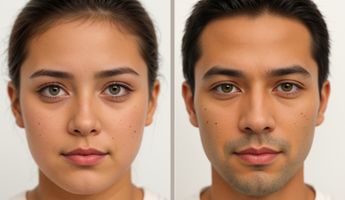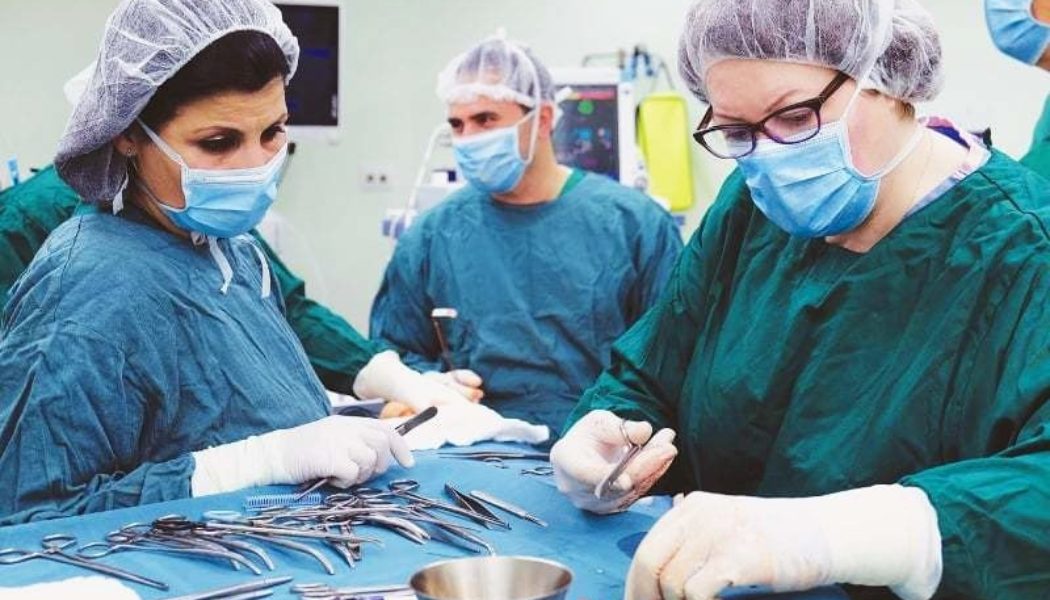Sex Reassignment Surgery (Female To Male) in Indonesia
Search and Compare the Best Clinics and Doctors at the Lowest Prices for Sex Reassignment Surgery (Female To Male) in Indonesia

Find the best clinics for Sex Reassignment Surgery (Female To Male) in Indonesia
No pricing info available
Thailand offers the best prices Worldwide
Price: $ 556
From 99 verified reviews
gra cia, 12 September 2020
the place is large, comfortable to wait for a long time, my consultant, Ms. Wulan, is kind and friendly, listening to the tone of her speech 😁. Thank you so much mba wulan for ur kind, oh yes the puri doctor is friendly too! don't rush in when I want a consul and it's good. can't wait for next week for action at the poise 🥰
- Home
- Indonesia
Compare Before & After Photos of _procedure_photos.phpSex Reassignment Surgery (Female To Male)


Half-side view


Front view


Half-side view


Front view


Front view


Front view


Front view


Front view
WHY US?
At Medijump, we're making medical easy. You can search, compare, discuss, and book your medical all in one place. We open the door to the best medical providers worldwide, saving you time and energy along the way, and it's all for FREE, no hidden fees, and no price markups guaranteed. So what are you waiting for?

Free

Best Price

Widest Selection

Risk-Free
What you need to know about Sex Reassignment Surgery (Female To Male) in Indonesia

Some people are born male and some are born female. While there are some people who are transgender, whose gender identity does not match their assigned sex. Sex change surgery, also known as gender reassignment surgery (GRS) or sex reassignment surgery (SRS) is there to help these people. This is a surgical procedure that changes the sex of a person. It changes a transgender person’s physical appearance according to there identified gender. It treats gender dysphoria in these people. This includes both feminization and masculinization surgeries. In masculinization surgery, there are two domains:
- Top surgery
- Bottom surgery.
In top surgery, mastectomy is performed to remove the breasts and give your chest a more male-like contour. Bottom surgery involves increasing the length of the clitoris which is called metoidioplasty, production of a penis, and scrotum which are known as phalloplasty and scrotoplasty respectively, and removal of the uterus that is a hysterectomy. This surgery is not for everyone. A number of things are considered before opting for surgery. However, normal people with assigned gender can also go for this if they want to.
Before the operation, your assigned sex does not correspond to your gender identity. You suffer from gender dysphoria. You feel uncomfortable in your skin. However; after the surgery, you are a person of your desired sex. You are converted from a female to a male.
What is the cost of Sex Reassignment Surgery (Female To Male) in Indonesia?
Like any intricate healthcare process, the price for undergoing Sex Reassignment Surgery (Female To Male) is not a fixed figure in Indonesia. The final tally significantly sways due to issues like the patient's comprehensive health status, distinct surgical necessities, and the operating surgeon's level of proficiency. It's vital, too, to factor in the cost of post-procedure care, prescribed medicines, and extra treatments, all of which substantially contribute to the total expenditure.
Moreover, distinct clinics situated in Indonesia might provide an array of payment structures or offer financial aid alternatives. It's advisable to undertake thorough investigations or reach out to prospective clinics directly to obtain a precise cost prediction.
What does a Sex Reassignment Surgery (Female To Male) Procedure Involve?
Anesthesia is given to ensure that the patient does not suffer from pain during the surgery. Top and bottom surgeries are performed differently.
-
Mastectomy: It is performed in two ways. In one method, an incision is given around the areola and excessive fat and breast tissue are removed through it. The skin is left as it is for a year. It retracts in this period of time. This method leaves prominent scars. In the other method, excess skin is also removed along with the tissue and fat. This leaves fewer scars. After this, male-like the contour of the chest is obtained.
In the other step, female reproductive organs that are present inside your body are removed.
-
Hysterectomy: Total Hysterectomy is the removal of uterus and cervix. Another surgery, bilateral salpingo-oophorectomy (BSO) is performed to remove fallopian tubes. In this way, the entire female reproductive system is eliminated from the body.
After this, procedures for the construction of male reproductive organs begin. They include,
- Metoidioplasty: Androgenic hormones are given to increase the length of the clitoris. Length is increased to almost 1.6 to 2 inches.
- Phalloplasty: It is performed to create a penis or to increase the length of it. It can be done in 4 ways. All of these work on the same principle. A flap of skin is taken from a donor site of the body such as an arm or abdomen to make a penis out if it. It is joined to the urethra. This is the most complicated step of GRS. An erectile prosthesis is inserted into the penis to achieve an erection.
- Scrotoplasty: Scrotum is produced from labia majora and prosthetic testes are inserted into it.
How Long Should I Stay in Indonesia for a Sex Reassignment Surgery (Female To Male) Procedure?
It is a long procedure involving a number of surgeries. There is top surgery and bottom surgery. Mastectomy takes 2 to 3 hours in the operation theatre. While bottom surgery requires more time. It takes 8 to 10 hours for a female to male GRS. You should plan to stay in the area for at least 14 days after your Procedure, During this duration, your health conditions are monitored regularly and your stitches are removed after 10 to 14 days. You can go home when allowed to by your physician.
What's the Recovery Time for Sex Reassignment Surgery (Female To Male) Procedures in Indonesia?
You will have to take 2 weeks off work. After 2 weeks, you can start a light activity and can go back to office work. A Patient will need more time to get back to physical work. You can start strenuous activity 4 to 6 weeks after bottom surgery. Pain killers are given in this period to deal with moderate pain. Scars take some time to fade away. It can take years after the surgery to settle both physically and psychologically.
What sort of Aftercare is Required for Sex Reassignment Surgery (Female To Male) Procedures in Indonesia?
Following points should be considered to look after you post-surgery:
- Go for regular check-ups.
- Take your medicines as and when prescribed by the doctor.
- Live with someone who takes care of you while you recover.
- Abstain from sexual activity till allowed by your doctor.
- Do not take a bath or shower with bandages intact. It can cause infection.
- Avoid strenuous exercise in the early few days after surgery.
- Do not lift heavy objects; it puts pressure on your stitches.
- Avoid excessive movement. Take a rest.
What's the Success Rate of Sex Reassignment Surgery (Female To Male) Procedures in Indonesia?
The success rate of Sex Reassignment Surgery (Female To Male) within Indonesia depends on a spectrum of elements. Such factors encompass the proficiency and prior expertise of the surgical unit, the comprehensive health condition of the person, their mental readiness, and compliance with the suggested after-treatment attention. An abundance of research has pointed out that a majority of individuals who choose Sex Reassignment Surgery (Female To Male) acknowledge a marked enhancement in their lifestyle quality, elevated mental health, and a noteworthy contentment level with the physical transformations.
According to a study, 97% of the people who went through this surgery found their results satisfactory. You need to be sure before opting for it, as it is a lifetime decision. GRS is mainly for the treatment of dysphoric and transgender people.
Are there Alternatives to Sex Reassignment Surgery (Female To Male) Procedures in Indonesia?
The following are some alternatives to sex reassignment surgery:
- Hormone replacement therapy: this therapy aids in changing your secondary sex characteristics according to your desired sex. In the case of female to male sex change, testosterone is given. This induces hair growth and coarseness of voice. It reduces breast growth and changes in fat distribution in your body. It also stops menstruation.
- Altering physical appearance: you can alter your physical appearance, your dressing, your hair, your makeup in accordance with your desired sex. Do regular exercises to build up muscle mass which will make you look like a male.
- Psychological counseling: it will make you handle your personality. Gender reassignment surgery cannot be reversed. Therefore, you should make your decision wisely.
- Cosmetic surgery: it is a wide field covering a number of domains. It can alter your facial features, your body fat, your waist, your stomach, your chest to transform you into your desired gender. You can go for liposuction, mastectomy, Botox, fillers, Rhinoplasty, etc.
All of the methods, mentioned above are not permanent but are helpful. For permanent change, you have to go for sex reassignment surgery.
What Should You Expect Before and After the Procedure
Prior to initiating the Sex Reassignment Surgery (Female To Male), it is necessary to ensure each individual undergoes thorough psychological analysis and counseling. These checks serve to affirm the patient's emotional readiness and ability to cope with the aftermath of the procedure. In addition to mental health evaluations, multiple medical assessments are implemented to inspect their overall health state. Recognizing any pre-existing health issues is of utmost importance as they can potentially impact the result of the surgery. Regularly scheduled consultations with knowledgeable healthcare professionals are fundamental to this process. These meetings will entail in-depth explanations and discussions to help formulate a holistic understanding of the entire procedure and its ensuing effects.
After the execution of the surgical procedure, there's a need for mental readiness for an extensive recovery period. This stage typically demands diligent post-procedure care and major lifestyle adjustments. Surgical recovery isn't typically a swift process - it's a path that entails physical changes and lifestyle adaptations, necessitating a period of adjustment for the patient. The adoption of healthy habits becomes particularly important during this period. Activities like regular physical activity, adhering to a nutritious diet, and incorporating stress-relief practices are proven to carry several benefits. Moreover, in addition to the emphasis on physical recuperation, mental health should also be prioritized equally.
What are Potential Risks of Sex Reassignment Surgery (Female To Male)?
Each surgical procedure comes with inherent risks and potential complications, including Sex Reassignment Surgery (Female To Male). These might encompass general surgical risks such as infection, bleeding, or adverse reactions to anesthetic drugs. Specific to Sex Reassignment Surgery (Female To Male), there may also be healing-related risks, which could result in necrosis or lackluster cosmetic outcomes. Educating oneself about the possible complications of surgical procedures is beneficial for better preparation.
Additionally, extended exposure to hormonal treatment might escalate the risk of cardiovascular ailments or osteoporosis. There could also be mental health concerns such as depression or anxiety, which may spring from society's responses or personal adaptation to a new identity. Frequent consultations with a healthcare professional are essential to keep track of and mitigate any possible risks or complications.
Whilst the information presented here has been accurately sourced and verified by a medical professional for its accuracy, it is still advised to consult with your doctor before pursuing a medical treatment at one of the listed medical providers
No Time?
Tell us what you're looking for and we'll reachout to the top clinics all at once
Enquire Now

Popular Procedures in Indonesia
Prices Start From $497

Prices Start From $1,552

Prices Start From $500

Prices Start From $1,000

Recommended Medical Centers in Indonesia for Sex Reassignment Surgery (Female To Male)

- Interpreter services
- Translation service
- Religious facilities
- Medical records transfer
- Medical travel insurance
- Health insurance coordination
- TV in the room
- Safe in the room
- Phone in the room
- Private rooms for patients available

- Interpreter services
- Translation service
- Religious facilities
- Medical records transfer
- Medical travel insurance
- Health insurance coordination
- TV in the room
- Safe in the room
- Phone in the room
- Private rooms for patients available

- Interpreter services
- Translation service
- Religious facilities
- Medical records transfer
- Medical travel insurance
- Health insurance coordination
- TV in the room
- Safe in the room
- Phone in the room
- Private rooms for patients available

- Interpreter services
- Translation service
- Religious facilities
- Medical records transfer
- Medical travel insurance
- Health insurance coordination
- TV in the room
- Safe in the room
- Phone in the room
- Private rooms for patients available

- Interpreter services
- Translation service
- Religious facilities
- Medical records transfer
- Medical travel insurance
- Health insurance coordination
- TV in the room
- Safe in the room
- Phone in the room
- Private rooms for patients available

- Interpreter services
- Translation service
- Religious facilities
- Medical records transfer
- Medical travel insurance
- Health insurance coordination
- TV in the room
- Safe in the room
- Phone in the room
- Private rooms for patients available

- Interpreter services
- Translation service
- Religious facilities
- Medical records transfer
- Medical travel insurance
- Health insurance coordination
- TV in the room
- Safe in the room
- Phone in the room
- Private rooms for patients available

- Interpreter services
- Translation service
- Religious facilities
- Medical records transfer
- Medical travel insurance
- Health insurance coordination
- TV in the room
- Safe in the room
- Phone in the room
- Private rooms for patients available

- Interpreter services
- Translation service
- Religious facilities
- Medical records transfer
- Medical travel insurance
- Health insurance coordination
- TV in the room
- Safe in the room
- Phone in the room
- Private rooms for patients available

- Interpreter services
- Translation service
- Religious facilities
- Medical records transfer
- Medical travel insurance
- Health insurance coordination
- TV in the room
- Safe in the room
- Phone in the room
- Private rooms for patients available
Sex Reassignment Surgery (Female To Male) in and around Indonesia
About Indonesia
Indonesia is a country in Southeast Asia, located between the Indian and Pacific oceans. It is the 4th most populous country in the world with over 260 million inhabitants. The country consists of more than 17,000 islands, which makes it the largest island country in the world. It is packed with beaches, volcanoes, tropical jungles, exotic animals, and culture. This wonderful country invites any adventurous traveler to explore its dramatic landscape. Today, Indonesia is also a potential medical tourism destination. Although it is not as popular as its neighboring countries such as Malaysia, Singapore, and Thailand in terms of medical tourism, the country actually houses numerous excellent medical centers. Many of the medical practitioners are well-trained and can communicate in English. The medical centers are equipped with cutting-edge technology and offer a wide range of affordable treatments. Some of the most sought-after treatments are blepharoplasty, liposuction, and breast augmentation.
Popular Parts of Indonesia
From busy metropolises, and sparkling beaches, to tropical rainforests, tourists will be able to find anything they want here.
- Jakarta is the capital of Indonesia. It is the melting pot of Indonesia's many cultures because thousands of people from all over the country live and work here. The city is home to numerous museums, some of which are the biggest in the country, such as the National Museum of Indonesia and the Museum of Modern and Contemporary Art in Nusantara (MACAN). The most famous landmark in the city is the National Monument or Monas which commemorates the Indonesian struggle for independence. The city also has a unique old city known as Kota Tua, where tourists can find many interesting colonial buildings.
- Bali is Indonesia’s main tourist destination which attracts more than 15 million tourists every year. The island is packed with striking beaches, diverse marine life, jungle-covered mountains, lively nightlife, opulent culture, and spiritual energy. Almost every beach on the island is worth visiting, particularly Seminyak, Nusa Dua, Sanur, and Padang Padang Beaches. You can visit the Pura Tanah Lot and witness its scenic beauty or go to Ubud Monkey Forest to watch the monkeys and explore the sacred temples.
- The Special Region of Yogyakarta is the center of Java’s traditions and it is the only region in Indonesia that officially recognizes the monarchy. The region is home to numerous ancient buildings and temples. Visit Borobudur temple in the early morning to watch the sunrise, and watch the sunset from Prambanan or Ratu Boko temples. Tourists who are eager to learn about the region’s past can wander around Taman Sari, a park of palaces, pools, and waterways belonging to the sultan.
- Medan is the largest city on the island of Sumatra and it is a gateway to the western part of Indonesia as well as a busy trading city. The most important attraction in Medan is Lake Toba which is one of the natural wonders of the world. It is a massive crater lake with an island in its center. The island, named Samosir, is almost as big as Singapore. This enormous lake has a depth of 450 meters, making it more like an ocean rather than a lake. The clear lake with picturesque mountains in the background gives an incredible view that will leave anyone in awe.
- Bandung is widely known as Parijs van Java or the Paris of Java because of its resemblance to Paris and European cities. Located on a river basin surrounded by volcanic mountains, it has a significantly cooler temperature than any other part of Indonesia. The city is a weekend gateway for people from the surrounding cities and it is popular for its delightful food, fashionable boutiques, creative arts, and lush green spaces. The city is filled with Art Deco, Neoclassical, and Gothic buildings such as the Savoy Homann Hotel and De Vries Building.
Weather and Climate in Indonesia
Indonesia experiences an entirely tropical climate. The average temperatures can vary based on the area. Coastal areas have an average temperature of 28 °C, the inland and mountain areas have an average of 26 °C, and the higher mountain areas have an average of 23 °C. There are two seasons in the country, but the seasons can start differently in each region. Generally, June to October is the dry season and November to March is the rainy season. The dry season is influenced by the Australian continental air masses and has a slightly cooler temperature than the rainy season. Tourists can expect mostly sunny days, but there will be some short rain showers. The rainy season can be very humid, and wet, and has a significant amount of rain.
Getting Around in Indonesia
Indonesia is well-connected by airports in almost every region. However, the largest airports are Soekarno-Hatta International Airport in Jakarta and Ngurah Rai International Airport in Bali. Both airports serve domestic and international flights to major cities around the globe. There are budget airlines in almost every airport, including Air Asia, Citilink, and Wings Air. Domestic flights can be rather expensive but will make traveling around the cities a lot easier.
Getting around the islands of Java and Sumatra can easily be done by trains operated by PT. KAI. There are 5 classes of trains: economy, business, executive, priority, and sleeper. The economy class can be a little uncomfortable and crowded, but tourists can get around several cities for as low as $4. Since the country is an archipelago, tourists can also travel from one island to another by ferry boats (long-distance) and speed boats (short distances such as Bali to Lombok).
Most of the cities will have their own mode of transport. The most common mode of transport is taxis and buses. Taxis are normally metered, but some drivers refuse to use the meter and force tourists to pay a fixed fare. Tourists should avoid riding these kinds of taxis and always insist on using the meter. The most reliable taxi companies are Blue Bird and Express. Bigger cities like Jakarta have MRT, LRT, and KRL (local trains).
Tourist Visas in Indonesia
Citizens of 170 jurisdictions can visit and stay in Indonesia for up to 30 days. Visa on arrival is available for 68 countries including Japan, the United Kingdom, and the United States. Nationals not listed in the visa exception agreement and visa on arrival need to obtain a visa before entering the country. It is advisable to check at your nearest Indonesia Embassy or Consulate for the visa policy. All visitors will need to have a passport valid for at least 6 months and a valid return ticket.
Additional Information
- Local Currency: The local currency is Indonesian Rupiah (Rp) and $1 will get you approximately Rp14.000.
- Money & Payments: ATMs that accept international cards are widely available in many cities. Credit cards are accepted in most established restaurants and hotels. If you are planning to visit small towns, it is advisable to carry some cash. Tipping is not essential but will be highly appreciated.
- Local Language: The official language is Bahasa Indonesia and people in major cities and tourist areas will speak and understand English.
- Local Culture and Religion: Most of the population follows Islam, but there are small groups of Hindus, Christians, Buddhists, and Confucianism. It is important to know that Indonesian people are friendly and conservative. Avoid wearing revealing clothes except on the beach.
- Public Holidays: Indonesia celebrates numerous national and religious holidays such as Independence Day, Eid Mubarak, Christmas, Vesak, and Nyepi.
Popular Searches
- Plastic Surgery in Thailand
- Dental Implants in Thailand
- Hair Transplant in Thailand
- Breast Augmentation Thailand
- Gastric Sleeve in Thailand
- Gender Reassignment Surgery in Thailand
- Laser Hair Removal in Bangkok
- Botox in Bangkok
- Dermatology in Bangkok
- Breast Augmentation in Bangkok
- Coolsculpting in Bangkok
- Veneers in Turkey
- Hair Transplant in Turkey
- Rhinoplasty in Turkey
- Stem Cell Therapy in Mexico
- Rhinoplasty in Mexico
- Liposuction in Mexico
- Coolsculpting in Tijuana
- Rhinoplasty in Korea
- Scar Removal in Korea
- Gastric Sleeve in Turkey
- Bone Marrow Transplant in India
- Invisalign in Malaysia
- Plastic Surgery in the Dominican Republic
- Tummy Tuck in the Dominican Republic
- Plastic and Cosmetic Surgery in Poland
- Rhinoplasty in Poland
- Hair Implant in Poland
- Dental Implants in Poland
- IVF in Turkey
